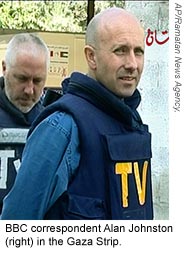New York, April 12, 2007—The Committee to Protect Journalists joins today’s international actions appealing for the immediate release of BBC correspondent Alan Johnston, who was abducted in the Gaza Strip one month ago.
“It is deeply troubling that a month after the kidnapping of our colleague Alan Johnston his abductors remain silent,” CPJ Executive Director Joel Simon said. “This abduction has undoubtedly had a chilling effect on journalists reporting the Palestinian story from Gaza. We appeal to those holding Johnston to release him at once.”
The BBC organized an “international day of action” in which Palestinian journalists held rallies in Gaza and the West Bank town of Ramallah. BBC Director-General Mark Thompson held a news conference in Ramallah to appeal for Johnston’s release. And in New York, U.N. Secretary-General Ban Ki-moon called for Johnston’s abductors to “release him unconditionally and immediately.”
Thompson told reporters that Palestinian President Mahmoud Abbas reported Wednesday that “he had credible evidence that Alan was safe and well.” Still, Thompson sounded a note of concern. “As time goes on” he said, “we, his friends and colleagues, are increasingly concerned about the physical and mental toll his incarceration must be taking on him.”
The BBC, Al-Jazeera, and Sky News aired a joint live broadcast calling for Johnston’s release today. The special program, which included contributions from CNN, was anchored from Ramallah by the BBC’s Middle East Editor Jeremy Bowen. It highlighted Johnston’s reporting in Gaza, the near-daily protests Palestinian journalists have held since his abduction, and the dangers of reporting from the increasingly lawless strip.
“About the only good thing to come out of the last month is the way Alan’s colleagues, especially here in the occupied Palestinian territories, have rallied around him,” Bowen said in his introduction to the program. “This is the first time that global news networks have come together like this. We stand united in support of Alan Johnston and all our colleagues who are in harm’s way.”
Earlier this month, Palestinian journalists staged a three-day job action in which they refused to cover official government news. The strike was intended to pressure the Palestinian Authority to do more to locate Johnston.
Despite assurances from Abbas that the Palestinian Authority is doing its utmost to secure the journalist’s safe release, Thompson said Johnston’s abductors have not made any contact or demands, the BBC reported. No claim of responsibility has been made, and the motive for the kidnapping remains unknown.
Palestinian Interior Ministry spokesman Khaled Abu Hilal told CPJ that a resolution to Johnston’s case has been slow because the abduction took place during a transitional period when a unity government was being formed, which impeded a quick response from the government. He added that the Palestinian security forces are weak at the moment, further complicating efforts to locate the journalist.
Johnston, 44, was seized by four armed men in a white Subaru as he was driving near the BBC’s Gaza City office on Al-Wihdah Street around 2 p.m. on March 12, according to CPJ sources in Gaza. Johnston was quickly identified because he threw his business card on the street, according to news reports.
Johnston joined the BBC in 1991 and has been based full-time in Gaza since April 2004. He was due to return to London at the end of this month.
Johnston, who has been held in captivity longer than any other journalist abducted in Gaza, is the 15th journalist abducted in the Gaza Strip since 2004, according to CPJ research. CPJ research shows that all of the previously abducted journalists were released unharmed.
Past kidnappings appeared to be the work of private individuals or groups seeking to exploit foreign hostages for political purposes or to use them as bargaining chips to secure the release of jailed relatives or to win government jobs. To CPJ’s knowledge, none of those responsible for abducting members of the media has ever been apprehended or brought to justice.
Read an open letter by Alan Johnston’s family.
Read the statement by BBC Director General Mark Thompson.
Read a report by BBC’s Middle East Editor Jeremy Bowen.
